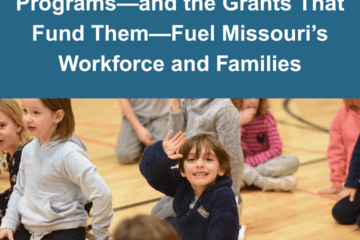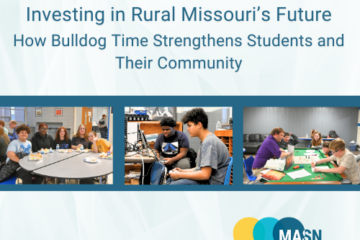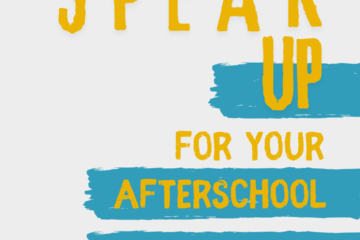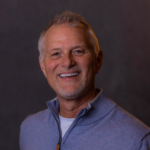
For over 25 years, Casey Conklin has been a force in the world of afterschool. She’s currently the Program Director at Warrensburg Adventure Club in Western Missouri, and her journey has been anything but ordinary. From her early days with the YMCA to her time at LINC and now leading the Warrensburg R6 program, Casey has created safe, enriching spaces where youth grow, learn, and thrive.
With a career shaped by mentors, personal resilience, and a deep commitment to supporting youth, Casey represents the heart of afterschool. Her ability to listen, adapt, and inspire is evident in every story she shares. Whether guiding staff or supporting students, every step leads to a stronger community.
We chatted with Casey recently to learn about her years of service in afterschool.
MASN: You’ve been in out-of-school time programs for 25 years now. How did you get involved in afterschool?
Casey Conklin: I started in the afterschool field with Four Rivers YMCA at a Catholic school in Pacific, Missouri, in 2000. They called me a site director, but I had one staff member, and probably about 30 kids from K–7. After that, I moved to the South County YMCA, where I had several kids in the afternoon. I was the site director and had enough students to have two staff.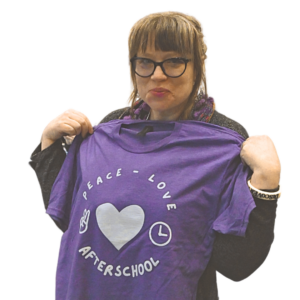
Then, I moved from the St. Louis area to Kansas City and started working for the Greater Kansas City YMCA. I worked there for five years, and I worked all over. From Mission, Kansas to Overland Park and at a Montessori school in Kansas City, Academy Lafayette. It was a French immersion school, which was crazy but also so much fun.
In the summer, they moved us to different communities. While working there, I started a summer program where we offered theater. I would go to various programs during the summer, and we would write a play, make all the props and costumes, and then perform it in two weeks. That was super fun.
While I was at the Y, I graduated from college and a friend called me about a job at LINC (Local Investment Commission). They were expanding and looking for people to work in the Kansas City School District. I thought “Oh, I would like that;” I already lived in midtown Kansas City. So I applied and got a job as a site coordinator for Caring Communities. It was a really pivotal time in my career. I learned that out-of-school programs are a fruitful ground for community development. I got to do community organizing—I fell in love with all aspects of community organizing. It changed the way that I looked at development. It pushed me into the community and family development side of what we can offer out of school.
MASN: You’ve been in the St. Louis and Kansas City areas in your career—what about before your career?
Casey Conklin: I have a liberal arts degree with a minor in theater from UMKC. I did my first two years, for my associate’s degree, in Union, Missouri, at East Central College, and then I moved to the University of Missouri in Kansas City. Before that, I grew up in Jefferson County, Missouri. I went to a county high school. They had no afterschool enrichment programs unless you were in clubs.
I was a kid who should have been in an afterschool program. I would have benefited from one in elementary and middle school. Instead, I went home and took care of my little brother and I made a lot of unhealthy choices as a young teen because there wasn’t anything available to do. I got in with a crowd that wasn’t great and created some unhealthy habits.
Home wasn’t always safe. My family was going through many transitions, and I didn’t have anywhere to process that. So, to balance out—you know how we balance our lives—I’ve dedicated my whole life to making sure I could offer something like that.
I never realized when I first started in the industry, or maybe I understood intrinsically, my passion for out-of-school and afterschool. I now see a clear path. I know there are kids who just need exposure to something enriching or different or a safe place because that’s what I needed.
It’s the time. I had so much spare time. Time that I could have been doing something different. I don’t regret anything and I’m grateful for my experiences. I can better serve families and kids because of it, but I hope that maybe there’s a young lady out there who gets fed and finds things out about herself because of our program or learns a little bit about life skills and resilience. And where to go if they need support. I take it personally when we do new things in our program because I know it’s helpful. It’s supportive for the next generation.
MASN: After devoting so much of your life to this field, what are your most memorable moments?
Casey Conklin: The mentors I’ve gotten in this industry—people who have modeled for me what it is to be a professional woman and a leader in a community that depends on you—stand out the most.
Janet Miles Bartee taught me so much about intention, Lee Bohannon taught me about community organizing, and working with Steve McClellan taught me to listen. Really listen. I think fast. My brain is always problem-solving. I’m good in a crisis, but to be present and absorb and learn the need—not presume the need, not make up what it is to have something to do—is important. I learned about the communities that LINC put me in by watching and modeling them. That experience changed my ability to connect with humans, and I’m so grateful for that.
I hear Lee saying, “Slow your brain down, keep your eyes open.” I use that all the time. And his idea that a one-on-one with someone can change everything is so true. Your ability to be present with one person who’s presenting a concern or challenge can change their world. I’ve been in this industry long enough to have seen that.
I’m also going to tell this story, and it’s going to make me cry. At MOSAC, I got to take one of my staff members, Joy, who’s made for the industry. I don’t want to press her to stay here if she wants to try something else–but she has the things. There are just certain things.
At MOSAC, she met people from MASN (Missouri AfterSchool Network) and some of my old teammates from LINC. I wanted her to learn about their philosophy and how they approach the industry. Watching her explore and see this is a real career was cool. I can say it, but for her to see it was really powerful.
So, we were in groups and she came back and said, “Casey, there’s somebody that wants to talk to you—he says you changed his life.” So I looked around her, and there was this young man, Damon. He had a LINC shirt on, but we didn’t meet at LINC. We met when I came to Warrensburg. I had him in my program for about two months and I didn’t ever see him again. He was going through a hard period, and I listened and was present. I remember saying to him, “I think you got something that fits this industry. When you go back to Kansas City, think about looking up LINC.”
At the end of the conference session, he came up and said, “You changed my life. Thank you so much for believing in me and being understanding.” It turns out, he did reach out to LINC and now is a coordinator for them running a huge site with a ton of staff. He was so happy, and he was doing so well. And we were hugging and I was crying. When I went to say bye to my LINC people, I told Carl [Wade], director of training and compliance at LINC, I was really glad he met Damon. He was like, “You know, Damon? He’s amazing Casey, he’s working his way up.”
We may not always know or see it, but we have a profound impact on each other. It resonated with me that we’re mentoring people on maneuvering this crazy, beautiful world we live in. I have been filled with gratitude and humility and hope.
MASN: If someone was considering going into afterschool now or had just started in afterschool, what advice would you have for them?
Casey Conklin: Find what you love. Find what you love to do with the children, and they’ll love it too. Find yourself, be willing to make mistakes, stay open, and listen—to the kids and your staff. It can be a real adventure. We have so much freedom in what we do with programs. And then be present. That’s not an easy ask. The way the world is shifting, where all information is quick and has to be entertaining, it can be challenging to sit still with somebody but learn that skill.
Be willing to challenge yourself and make mistakes. Try an activity. Try something with the kids. You’re gonna know if they don’t like it. You’re going to know right away. But don’t feel like you failed. You think, “Okay, that didn’t go over so well,” so try something else. Be curious. Kids love to be encouraged to be curious. Not to sound like an old person, but we’ve done ourselves an injustice by everything coming at us so fast. We’ve lost some of our curiosity. And I think it’s something that our industry can sustain if we keep that feeling of curiosity, that spirit of experimentation. Let’s accept we’re messy humans—the staff and the kids. Let’s just go with it (within reason). That’s my job. I’m the perimeter center, so I’m making them feel comfortable to come to me with ideas and support them.
MASN: Do you have any final thoughts about the field of afterschool?
Casey Conklin: You know, this industry attracts unique individuals from many backgrounds. We have different degrees. We have different varied reasons for why we landed here. I was exposed to people that I never would have gotten an opportunity to be around, and it made my world bigger. I’m really grateful for that.
Especially these last couple of years, I thought maybe I needed to switch gears. There is so much change and new things thrown at us all the time, and COVID was really hard. But even at times when I was discouraged–and there have been times–I’ve always held to that piece of that little girl who needed a program and someone to see her. I stayed because I know we’re providing that every day.
Those years during COVID I was so unmoored. I’d been at a non-profit for 18 years and I was completely blown away by what it was to be in a school district-based program. I was so lost and finally got things rolling then, boom: COVID happened. The only thing that made me feel anchored was MASN’s directors’ meetings. We were facing so many challenges, but being able to sit with other program directors and talk about it, and the MASN team saying we’re looking into that for you, it was like someone had my back.
Today, I met with the Quality/Professional Development Committee, and I wrote them an email thanking them so much for their work. They do a lot of heavy lifting. I’m so grateful to Ashlee [Liska] and everyone advocating for us. I love everyone at MASN. They’re doing a lot of really awesome work. And Ashlee’s on it! I feel like she’s a go-getter. If I’m with her, I better put on my running shoes. I want to be ready to have conversations to better support our industry.
I feel passionate about having access to high-quality child care for all economic demographics. I feel like that’s what Terri [Foulkes] was saying today. Really, that’s what MASN’s about. And I’m so on board for that journey. I grew up in this industry and want to give back in any way I can.

